#All... eroticized misogyny..
Text
thinking of that transles separatist girlie who said every attractive trait in men is eroticized misogyny
#and she was right abt it too!#lmao i tried to look up her tweet and first thing that came up was mackinnon 😭 figures#shes a little... Too mackinnonist / wittigian but i appreciate her boldness. this is a feminist quality#feminism#like do u ever just Think abt that like...#literally. standards for guys. tall big muscular -- usually moreso than you#All... eroticized misogyny..#and i mean. obviously me too i mean look at my bio. miguel o'hara stan#its just crazy gurl#patriarchy bes like hijacks ur sexuality#like .. its so crazy when u think about if u met one of ur fictional squishable guys irl#keiji would be / Is an insufferable misogynist pig [as in. yknow. 🚨] & miguel is just a prick#very cis male coded in the specific ways theyre written#gender minorites tend to internalize hurt esp women. whereas usually cis men externalize it#and not just verbally but also physically#ie keiji killing megumi and miguel FUCKIN DRIBBLING MILES LIKE A BASKETBALL#but if u make them butches then its like. patriarchy solved<33#this is why loving butches is feminism /lh except its also tru#cis maleness is soo reeeee#no like#no like ..#there slike this fashion influencer who named her cat simone pawvoir#i need to go back to sleep
5 notes
·
View notes
Note
hi sorry (one of the previous wumph anons): this is completely random and there’s no need to answer this but… you said you got a lot of anons on the topic. What was the general consensus on the whole phenomenon among them?
Just to contextualize this ask: I recently mentioned how the whump community (known for romanticizing the extreme anguish, torture, and trauma of fictional characters) has an abnormally high amount of members who identify as trans men. And more interestingly, that almost all the characters whose anguish this community romanticizes are male as well. Many radical feminists have subsequently discussed why this might be.
I can’t say there is much of a consensus at all. Most theories I received as to why this community almost exclusively romanticizes the anguish of male characters were vastly different, and at times, outright contradictory. However, here are the most common ones:
-It’s a homoerotic fetish. This is an obvious and uncomplicated conclusion to draw; most members of the whump community are simply girls who fetishize male homoerotic dynamics. This effectively explains why the whumpee, the whumper, and even the caretaker are most frequently all male characters.
-Readers have too much compassion for female victims. Many radfems expressed that female anguish is too reflective of reality—especially considering most whump themes are forms of abuse that, outside of fiction, females are the primary victims of. The result is an uncomfortable degree of realism in which female readers may involuntarily project themselves onto the victimized female character. Therefore, replacing the victimized female character with a male helps to dilute the degree of realism and create a necessary distance between the reader and character.
-Readers lack compassion for female victims. Other radfems including myself feel that whump consumers fixate on male victimization because female victimization is expected, eroticized, and trivialized—meaning, female-coded anguish is only recognized as horrifying and emotionally compelling when experienced by a male character. Essentially, female victimization titillates the audience, but male victimization is treated rightfully as a horrific and traumatic incident. Thus, the appeal for male victims is an obvious conclusion; only then is trauma and violence treated as it should and only then is the victim truly treated as a victim.
-Male victims are an intriguing reversal of gendered expectations. Self-explanatory. A handful of radfems stated that seeing a male character in a vulnerable, victimizing, or compromising situation might be an intriguing reversal to the assertive and combative male character archetype. This is a convenient answer, except that it fails to explain why the abuser (or whumper) in these scenarios is still male and not female, considering that a female abuser would also constitute as an intriguing reversal of gendered expectations.
-Male characters are generally more compelling. Again, some radfems have stated that male characters are simply better written, but I find this another highly convenient yet fallacious theory. In my opinion, this is an oversimplified analysis in which female readers fail to consider how deeply, unconsciously, and invisibly their internalized misogyny actually runs, and instead choose to project that internalized misogyny onto the author. I elaborate more on this here.
-Male victims are vicarious revenge for misogyny. This was the rarest and most conflicting answer. Only three radfems expressed that seeing male characters in victimizing situations operates as a form of imagined revenge for either the male character’s machismo or the machismo of real-life men. This is unconvincing not only because of the obvious fact that female readers adore these victimized male characters, but also because the main appeal of this genre appears to be sympathizing and rooting for the male victim. An anonymous asker articulated the issue with this theory quite nicely:
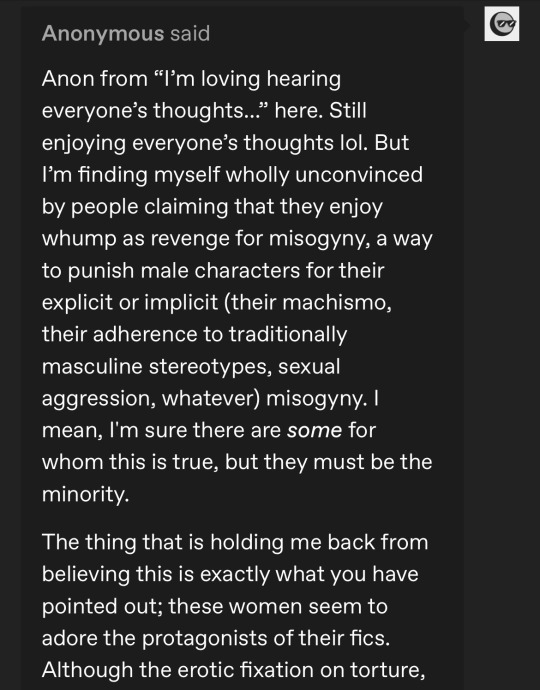

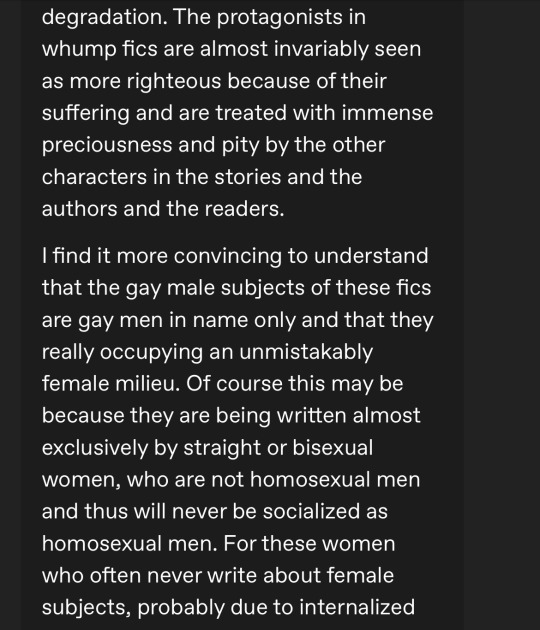
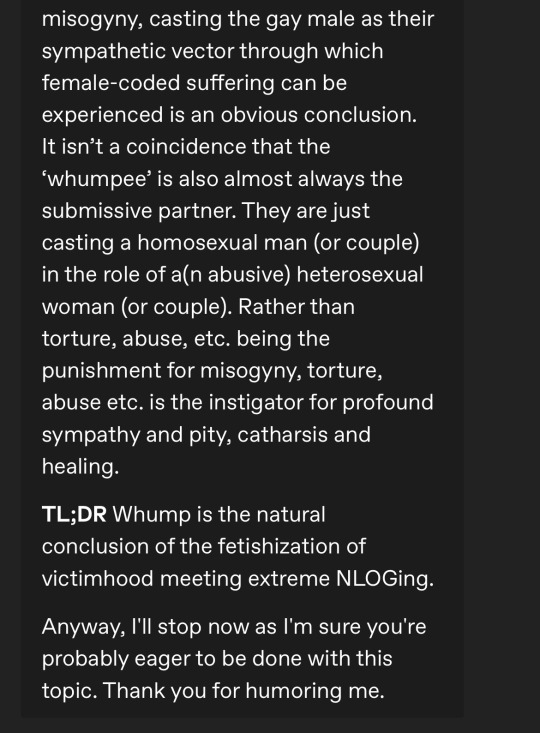
In conclusion, it’s a highly controversial but fascinating discussion. I’ve enjoyed everyone’s commentary so far, even if I disagree with some of it. And I’ve tagged all posts related to this discussion under #whump on my account, in case you want to read through them and form your own opinion.
157 notes
·
View notes
Text
Pornography is regularly used in ways that have nothing to do with sexual explicitness. Rather, pornography is commonly understood as a form of propaganda, a representational style linked with defamation and desensitization, if not destruction. Patricia J. Williams, who thinks legally, critically, and gracefully about race, sex, and injustice, calls pornography a "habit of thinking," and one that informs all manner of abusive and exploitative attitudes and relationships. Pornography, as I am using the term, is just that, a worldview, a way of thinking and acting that sexualizes and genders domination and submission, from the bedroom to the war room, making domination masculine (even when a woman plays that role) and submission feminine (even when a man plays that role), and making both the essence of sex. By wedding sexuality to inequality, pornography conditions women and men to have a substantial investment in maintaining the oppressive status quo—again, from interpersonal relationships to international politics.
Pornography kills off, and then substitutes itself for, the erotic—the life force, the earthy and ethereal force of growth, fruitfulness, exuberance, ecstasy, connectedness, and integrity. Pornography severs eroticism from intimacy and empathy and bonds it to voyeurism and objectification (of the self and of another). It incarnates pleasure in acts of hatred. It would have all of us believe, even those of us getting the "fuzzy end of the lollypop" (Sugar/Marilyn Monroe's lament in Some Like It Hot, Billy Wilder, 1959), that without a certain measure of power and powerlessness, danger, fear, pain, possession, shame, distance, and violence there wouldn't be any "sex" at all. Of course, the simultaneously pornographic, monotonous, and erotophobic culture tends to make that true. Variously damaged, alienated, and desensitized, pornography can become what we need in order to feel at all.
Some applaud pornography because it allows access to sexual imagery and language and easily offends offensive religious morality. Yet pornography is no real alternative to systemic sex-negative morality; rather it is an intrinsic part of it. Pornography and mainstream morality both stem from and continually reinforce a worldview that first makes a complex of body/low/sex/dirty/deviant/female/devil and then severs these from mind/high/spirit/pure/normal/male/god. For both, sex itself is the core taboo. Moralism systematically upholds the taboo and pornography systematically violates it. In the complex that evolves from this absurdity, taboo violation itself becomes erotically charged. Evil becomes seductive and the good mostly boring. Without patriarchal moralism's misogyny, homophobia, demand for sexual ignorance, and sin-sex-shame equation, pornography as we know it would not exist. And, together, the two work to maintain the sex and gender status quo.
—Jane Caputi, "Goddesses and Monsters: Women, Myth, Power, and Popular Culture."
#jane caputi#feminism#radical feminism#radblr#radfem#women against pornography#anti-porn#feminist film theory
240 notes
·
View notes
Note
I really don't want to open a can of worms with this, but why would some folks be disinclined to the possibility of Ed being a bottom (say at least once) with Stede?
Oh boy. OK. I think this all comes back to Izzy as representative of a patriarchal and misogynist society that has particular ideas about gender and sexual roles.
I went into a lot of detail on this older post. One of Izzy’s problems with Stede - and also with Ed as he is outside of Blackbeard - is that Stede refuses to fall within the correct position on the masculine hierarchy, and this feeds into Izzy's reaction in the stabbing scene, which is the first intimation both Izzy and the viewer have that Ed would like to be penetrated by Stede. To Izzy, the idea of the soft, effeminate man penetrating the powerful, dominant man is offensive because penetration is about dominance and shaming. To him and to anyone who takes this view, Stede topping Ed would degrade Ed. This concept is deeply misogynist because it assumes that men who “act as women” (are penetrated) are lesser than and are being possessed or humiliated by men who “act as men” (do the penetrating).
So, IF you take Izzy’s (the misogynist and patriarchal) perspective that penetrating is about enacting power/control/possession over another, then Stede (white man) penetrating Ed (moc) could be seen as itself racist. This reading would begin with the assumption that any man who is penetrated is being subdued and degraded, and to have a white man doing that to a MoC is doubly shameful and racist. But you have to make the a patriarchal and misogynist assumption to get there.
I do not at all think this is the assumption the show makes. It is a toxic viewpoint that bases itself in misogyny and strict gender and sexual roles that casts the person being penetrated as being possessed/shamed by the person doing the penetrating.
Something this show does really well is to reveal how very toxic the gender and sexual binary is. The characters are all trapped in these strict roles that are against their desires, and they are free and happy when they shake loose from those roles. Ed wants to be safe with someone; he wants to be penetrated safely and without pain, and Stede is someone with whom he feels safe and who does NOT see penetrating him as staking a claim or as something that gives him CONTROL over Ed’s body or Ed’s emotions. He doesn’t gain pleasure from harming Ed in any way, and he does not see gay sex (regardless of role) as shameful (we see this in the scene between him and CJ).
This is one of the reasons why the stabbing scene is actually so important—Stede does not recognize eroticism in causing Ed harm, and Ed is working towards being able to ask to be held and touched and penetrated without harm, by someone who does not treat it as degrading Ed.
This is all based in the context of the show and the characters. and another show, differently written, could have made all the dynamics very problematic indeed.
We joke about it, but Stede topping Ed does indeed have thematic importance both to the characters and to the show’s overall project in upending patriarchal assumptions about gender and sexuality.
#ofmd#our flag means death#ofmd meta#hope that was clear but please if someone disagrees or if i misstated#let's talk about it#not yell about it#edward teach#stede bonnet#izzy hands
67 notes
·
View notes
Text
on labels
The back and forth over the use of the word “queer” baffles and frustrates me. I think the arguments, and the term itself, are illustrative of a dialectic. Queer is simultaneously collective and individual, affiliation-group and self-identity, over-arching and specific, degrading and embracing. Until a time comes that all variations and expressions of gender and sexuality (and combinations thereof) are free from social and institutional stigma, queer will never mean just one thing.
Queer, as an over-arching term for anyone who is NOT cisgender, heterosexual, or perisex, acknowledges the overlap and interplay of gender assigned at birth, identified gender, gender expression, sexual attraction. A cisgender, butch dyke (a person assigned female at birth who aligns with that identity and is attracted to other women, while expressing her gender in a “masculine” manner) and a faggy, transgender man (a person assigned female at birth who “rejects” womanhood while dating men and expressing an “effeminate” masculinity) may seem very different from one another but can have MANY shared experiences of “queerness.” Both may be targets of transphobia and misogyny — even when one of them isn’t trans and one of them isn’t a woman — and both may be targets of homophobia. “Queer” (can, should) holds space for all of these aspects of self, even when they seem to contradict one another.
(How can a transgender man experience misogyny? When he is not perceived/treated as a man, but as a “failed woman.” How can a cisgender woman experience transphobia? When she is perceived/treated as a “non-passing” transgender woman encroaching upon “women’s spaces.”)
When this hypothetical cis dyke and transfag both claim the word “queer,” there is (or should be, in this umbrella interpretation of queer) an understanding that “your fight is my fight.” We may not be the exact same flavor of queer, but our liberation is interconnected. My freedom, as a transgender man, cannot be won at the expense of women’s freedom. I don’t mean that just in the sense that I would be morally opposed to that situation; I mean it in the sense that the oppression of women WILL impact my own freedom.
The baroque complexities of queerness become further entangled when considering race, religion, and disability. Can “queer” hold the history of racialized gender in America? That black people have been hypersexualized/virilized and subsequently fetishized and denigrated for this projection. That East Asian women have been seen as seductresses or naturally submissive, while East Asian men are desexualized or objectified as seeming young and effeminate. The stereotypes of the hot blooded Latina and the macho Latino. Can “queer” encompass the deliberate destruction of Native gender identities and the subsequent (current) obfuscating mythologizing by white queers? Can “queer” be a place for people who see their gender and/or sexuality as a manifestation of/connection to the Divine while also being a place for those deeply harmed by religion because of their gender/sexuality? Can “queer” accept people with disabilities as people capable of eroticism even if their bodies don’t allow for some forms of sex acts?
As a dialectic, rather than a static fact, queer can hold these things, and there are times that queer will be too broad for all these things and specificity is needed.
As a dialectic, queer is a slur and an academic term. Queer is an acceptable word in a peer-reviewed journal, and has the potential to be “fighting words” interpersonally. What matters is the context and the individual interpretation. And it’s HIGHLY personal.
I was born and raised in Texas from the 90s to the 2010s. I never heard queer used as an insult, except in media from (or set in) the past. If I had heard someone use queer as an insult, my initial reaction would have been confusion. Are you fucking old? Is this the 70s? But I did hear gay used as an insult all the time. And faggot and dyke, if there weren’t any teachers within hearing range. I didn’t really encounter queer until undergrad, as an academic term, an area of study, and then as how my friends self-identified. Because of this, my associations with queer are largely positive.
But I know people who also grew up in Texas, only a 30-45min drive away from where I grew up, who did experience queer as a slur. For them, they may feel more comfortable reclaiming fag or dyke, rather than queer. And that’s their decision to make. And yet, it would be reductive if they were to treat queer as only ever a slur, not as a word with decades of usage in academic and intracommunity contexts.
I like queer as a word that can veil meaning.
It can be a conversation stopper. You don’t get to know the specifics of my gender history, my sexual partners, the roles I take in sex, the acts I enjoy during sex.
It can be a conversation starter. I see you’re different in a way that is similar to how I’m different; let us now ask each other oblique and leading questions that the cis hets around us won’t understand.
I dislike how queer is increasingly absorbed into the corporate rainbow-washing of assimilationists. A company doesn’t get to sell me Pride merch with one hand and donate to anti-trans politicians with the other hand.
I cannot say that queer retains its edge, nor can I say that it has been defanged. I cannot force others to reclaim the word, nor can I gatekeep the word. In the first “queer studies” class I ever had, my professor explained “autonomy” literally means “self-naming.”
There is no right or wrong answer, there is only ever-increasing nuance.
268 notes
·
View notes
Text
Sissification - a toxic construction of femininity or getting off on outdated social constructs?
Becca here. 😀
First… I LOVE THAT YOU STARTED THIS DISCUSSION!!!! Thank you so much @youngchastity - who wrote to us (and tagged us in a post) for some healthy discussion around the sissification kink. We’ve definitely had a few things to say about it on the podcast, as have our guests. You can read his post, that started this conversation, here
Rather than speak for both of us at @kinkyintherealworld, I’m going to jump in and answer this from my point of view.
@youngchastity I love your thoughts on gender - I totally agree. I actually reblogged a post by @necromimetics the other day that said:
“can’t stop thinking about my friend’s cishet partner who said last night that he doesn’t think anyone is the same gender. god-tier take.”
And I agree - we’re all a wibbly-wobbly swirl of masculine, feminine, and everything in between energies, and everyone has their own unique blend. Trying to squash us into labels is lame as hell.
I like to think I am never one to kink shame (keeping it safe, sane and consensual), and in world where I (and many other women) want to smash the patriarchy, I may be a bit more sensitive to kinks that look down on femininity - or that’s how I have perceived it to date. As someone who has struggled with gender equality issues in real life (your capitalism comment made me give a disgruntled, but amused, snort), it’s hard to not knee jerk react and feel like I need to defend womanhood/femininity. There is still a power imbalance in the world, and equality is still a goal yet to be achieved, but upon dissection, is in the bedroom, playing with kinks, even a place we need to bring this battle? A question that has been raised to me, even before your message.
It’s funny, because I have actually had your very points discussed with me, last fall with my partner, Misty (who if you have read my personal tumblr is trans-personality who enjoys both sides of the gender spectrum fluidly) - we were on a road trip discussing the two episodes you made note of in your post, episode #16 and #19. And Misty, like you, felt we were missing the mark. S/he felt that in no way does sissification for the purpose of humiliation somehow degrade/make fun of/make lesser femininity. For all the same reasons you stated. S/he and I actually talked about doing a podcast about it, to dive more into the topic, Misty felt that strongly. It should be noted that Misty is NOT into sissification or feminization for the purpose of humiliation, and still she felt that we gave the sissification kink a bum rap.
Hearing her thoughts and yours, I think it is something that should be revisited and, for me personally, I need to take a closer look at why I find it uncomfortable.
Since you made such lovely points I want to try and address each one!
We’ve established that we both agree the trappings around what we consider to be masculine and feminine are made up (and ridiculous). I think, the kink we are talking about here is ultimately humiliation through outdated (but still most commonly accepted) societal norms. IF you get embarrassed about having those things stripped away, and “forced” into the opposite direction… good for you? I mean seriously, how fun is it to get off in weird and wonderful ways with someone who shares your kink from a slightly different perspective! The reality is, I believe, this isn’t hurting anyone. You want a person to lock up your dick, make fun of your little penis (your actual size is irrelevant), or put you in clothing that bends your mind with eroticism and makes you flustered with sexual need - awesome! Life is too short not to enjoy the kinks we have.
The bigger question, if I want to dig into the piece that makes me feel uncomfortable is, “Is there misogyny in the specific kink?” - and the answer to that, for me upon reflection, is no. Misogyny comes from the person performing it. So yeah, some kinky things are done with TONS of misogynistic intent… but that isn’t concentrated in one area. Those assholes are everywhere.
To me, feminization is never something that goes hand-in-hand with sissification. My partner feminized himself (their pronouns are all over the place), in a loving way. To empower the feminine in himself. He has often described it as blooming or becoming a butterfly - his higher form of being. So no humiliation to be found, for either of us on either end. I find it hot as fuck when he is all dolled up.
I haven't dipped my toes into the humiliation via feminization kink (...yet?), so it’s hard for me to wrap my dirty little mind around it.
Weirdly I do have a bimbofication kink for myself… sometimes. 😁 If I am in a particular mood for the fantasy. I have never found the right time/partner/energy to explore that. Am I feeling humiliation when I go there? I don’t think so…? More the need to feel desired, trophied (yes I made up that word), and used in a deeply submissive way. I’m not embarrassed about that. ;)
I too would be interested in hearing from women who enjoy humiliating others through feminization/sissification, and how they feel about it. Awesome point! 😀
Celebrating feminization! Now that is my jam! 💗 Give me a soft cute boy, and let me make him weak with wanting to be pretty and obedient for me. To me this is a huge mind shift - the key word “celebrating”, not shaming. Gosh, I could just sink into this topic like the perfect bubble bath. To me, this is a core element to gentle femdom. It is about making boys better… pretty, soft, sweet things that want to please - the D/s element being a key piece. The submissive to be absolutely loved and worshipped for their submission. No shame, not less than me, and certainly not shifting my own very feminine self. I love the feminine. I love to see it in men, and men embracing that side of themselves. Is this a form benevolent sexism? I don’t know. And more to the point, if I am engaging in it with my partners, writing about it on tumblr, and reblogging things that I enjoy around the topic, am I hurting anyone? Food for thought, but I am going to keep doing my thing. ;)
I feel like you can look at BDSM here, and for those who wish to criticize it, could for its dynamics. But that feels like a giant, whole other post.
Another thing you mentioned in this point was the strapon, and it’s use as a symbol of power. I have never seen it that way. To me, it is my soul penis… and I love being able to be inside my partner(s). It is an act of love, and makes me want to bring them to amazing places of pleasure (while I get off too). I really don’t enjoy the pictures of women wearing strapons who look like they want to punish their partner with it. But that’s just me. I know lots of people must enjoy that because there is a shit ton of porn that looks that way.
Playing with gender. I like that - and I do it! I love being able to put on a penis!! I really enjoyed trying my hand at Drag King make up and going out as a boy (I’ll post my picture again). I LOVE seeing boys in make up and fucking gender norms right out the window. You said it in your post - gender is made up and stupid. So yeah, let’s play with it, and maybe even break the molds! Though then you’ll have to find something else to get embarrassed and turned on about. ;)
Our kinks are about orgasms and pleasure. Let’s enjoy them.
In the end, it is all about intent and the people doing it. Not about the kinks themselves. People who want there to be an imbalance of power between women and men will keep doing mean spirited things to keep that nightmare alive - in the streets and in the sheets.
I feel like I have answered your points (I may have jumped around a bit), and I don’t feel the need to argue any of them. Misty had already shone a light on where I may have not been seeing the bigger picture.
I am SO HAPPY you wrote us a message, and that you took the time to write out your thoughts (that can be read here). So sorry it took me a while to see it and respond!
I am always up for conversation and debating (with kindness) any of the points.
I definitely feel this topic should be a podcast. Any chance you'd like to be on it @youngchastity? ;)
Hugs!
Becca
24 notes
·
View notes
Note
what the hell is the male or female gaze and why are zutarians obsessed with it
You know how some scenes in movies and shows, especially those from a few decades ago, have some scenes that exist solely to show off how hot an actress is, but in a really, really weird way that doesn't feel like a hot moment in a story, but a story suddenly being interrupted and turned into a cheap porno? You know, those scenes where there's a conversation going on, but the camera is practically up the actress's ass?
Some feminists starting pointing out how these scenes neither fitted the tone of the stories, nor were all that appealing, how many of the actresses were coerced into them, how many directors treated them like shit during said scenes, and how some of these actresses were MINORS, and how often times this was the only role of women in stories. "Look hot for the benefit of this male director and male audience members that think women are sexual objects, then disappear."
They also noted how, in some states of the US and in other countries, some set-in-stone rules about what things related to sex could or could not be shown to certain audiences had some sexist undertones. For exemple, a scene with no nudity of a male character getting a blowjob from his girlfriend was ALWAYS considered less inappropriate than him eating her out - again, even with no nudity or anything too explict. Violent rape scenes with the girl crying her eyes out for several minutes did not change movie ratings, while a quick scene showing a girl getting to orgasm did (but a guy having an orgasm wasn't a problem).
There was also the classic "Guy was in charge of directing a lesbian sex scene, made it look like a horny 11-year-old boy's very confused notion of how sex without a penis could even work."
They refered to that kind of thing by the catch all term" the male gaze".
Some people thought the term was great. I always felt it was unnecessary and a bit pretencious since we already had terms for those things: Misogyny, double-standards, exploitation of minors, abuse of authority, puritans seeing consensual sex/sex positivity as inherently more sinful/inappropriate than violence (even sexual violence), clueless men that think the experiences of gay women are the same as this fantasies, or just the regular crap movie trying to get the audience horny enough to watch it even though it has nothing to offer.
There was also a tiny, small, huge with problem with it: it implied men were always the bad guys, and women always the victims. No room to discuss women that abused their authority (look at the literal thousands of abusive "mom managers" of child/teen stars that gladly allowed hollywood creeps to perv on their children) or the men, and underage boys, that were also sexualized to absurd degrees (plenty of the infamous Twilight scenes of the werewolf guy constantly being over-sexualized happened when he was still a teenager).
And, it also led to a bunch of very stupid consequences:
1 - People claiming any kind of eroticism on screen was ALWAYS bad, inherently exploitative, served no purpose in a story, and could only be appealing to guys, not girls.
2 - People labeling ANYTHING they didn't like as "male gaze" or "male fantasy" - see Zutarians claiming Kataang is the writers' incel fantasy of the Nice Guy getting the girl that is totally not into him).
3 - Women labeling anything they personally liked "female gaze" as a way to imply their opinion was "superior" due to supposedly being "feminist" - see Zutarians claiming Zutara is the "female gaze", the "feminist ship", or that all the fanon content for it "by women, for women (and guys that are not sexist)."
These words are just like toxic, problematic, abusive, etc. It's the classic "There was a point to this at first, it got derailed pretty fucking fast, and now annoying, pretencious people on the internet will use this term incorrectly FOREVER because they think it makes their opinion objectively correct."
(The only difference being, again, I personally always felt like "male gaze" had some problems even without the internet watering it down to meaning "I'm right and you're wrong because I'm better than you")
39 notes
·
View notes
Text
Th'problem I have with a lot of takes on Abigail is that they seem... extremely gendered, or determined to contextualize everything about her character in terms of gender and misogyny. And while that makes sense with characters like Margot, or even arguably Alana, I just don't think gender is a key thematic concern in what's going on with Abigail.
Like, I'm thinking of takes on her as a predestined "dead girl character" archetype, or the Laura Palmer parallels - and while the Twin Peaks interpolation is pretty big in Hannibal, and there are some points of comparison, I just think that what Laura and Abigail have going on is entirely different (given, for example, that Abigail isn't the epitome of teenage femininity and the object of lust, and that her and her doppelgangers' deaths aren't nearly as explicitly wrapped up in the discourses of the eroticization of young women's deaths).
I'll acknowledge it's possible I'm biased here, given that I do more often tend to get drawn to female characters who are "gender unmarked", but... I just genuinely do not think Abigail's arc has much to do with gender! I think one thing mencie's fic is good at demonstrating is that putting a male character in her position doesn't change the themes of her arc at all - and the only things that do change are a result of Will and Abigail's different personal dispositions.
I don't think it's impossible to come up with a reading of her that involves gender, or that such readings are necessarily wrong. But I do think it would be an extrapolation that would require bringing in other stuff in conversation with the source material. It's not a reading, to me, that feels like it has a direct through line to what we see in canon, in the same way that "family trauma and legacy" or "nurture vs. nature vis-a-vis murder" as thematic concerns of her arc do. And it's a reading that I just find a bit personally alienating.
23 notes
·
View notes
Note
top ten first watches of 2023?
I assume you mean films, right? Anyway, top 10 in no particular order.
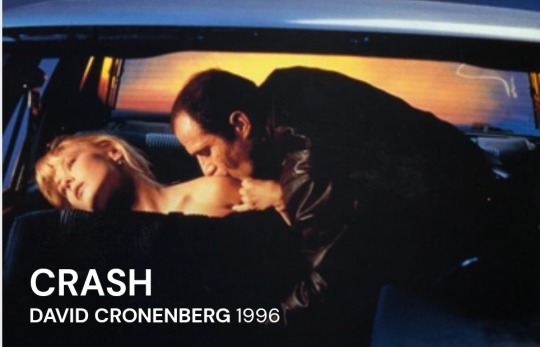
Crash was a long time coming, but it took a podcast I used to listen to weekly to finally get to this Cronenberg classic. Bodily modifications? Violent eroticism? Body as a machine? Death & eroticism? It has it all and much more.
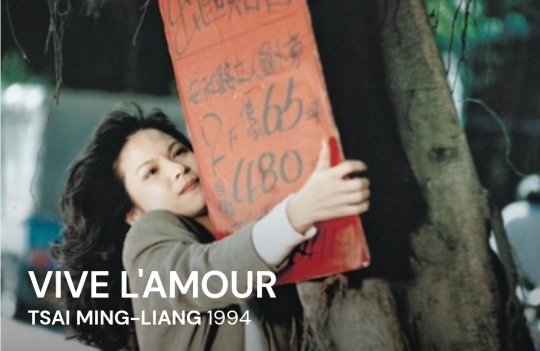
For those of you in your 20s and 30s (or even older) who feel alienated in the urban landscape, surrounded by crowds whilst feeling lonely and yearning for any type of human connection, this film is for you.
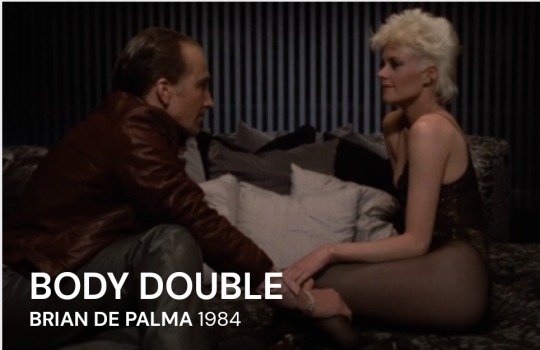
It's no secret that Brian de Palma wanted to be Hitchcock since he was a baby (I assume, but it sure does look so). You can see it in so many movies of his and Body Double is a perfect example. It even has the misogyny down to a T. But it's also really good and I'm a fan of voyeurism in cinema (from a critical position mostly). This is like Rear Window and Vertigo mashed together, but with 80s hair.
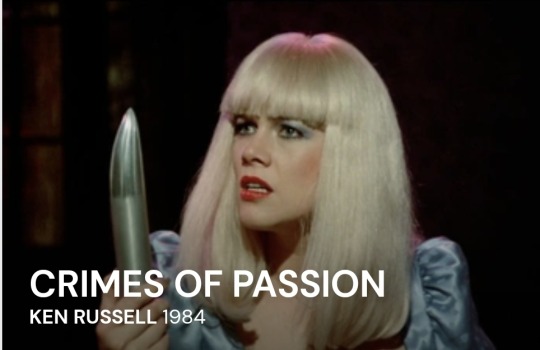
Now this was probably the highlight for me this year. Editor by day, sex worker by night, Kathleen Turner is a force in this film, alongside Anthony Perkins, the perverted priest. But if that is not enough to do the trick, the cinematography and that anal sex scene might do the trick 😉

Who knew Joan Crawford had such a big issue with wire hangers? Not me, but I sure found out in that crazy scene that has one of the most memorable meltdowns in cinema. Every shot of Faye Dunaway screams "I want that Oscar, god damn it!"
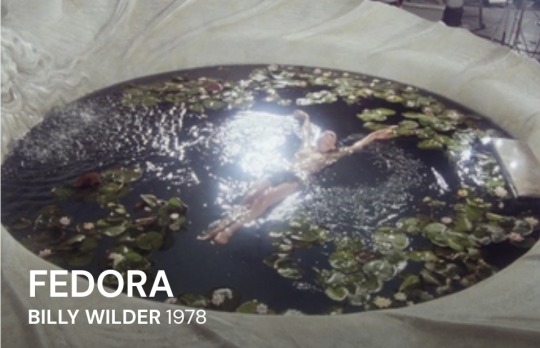
Fedora is the late 70s version of Sunset Boulevard and it has the same director. Not as good as that classic, but my god, the clothes! I'd watch it again just for the clothes, particularly that white suit Fedora is wearing in the garden of her villa when she receives that honorary Oscar.
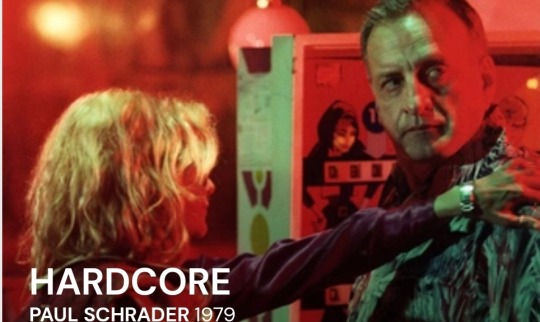
I don't think there's any Paul Schrader film that I didn't like. It wouldn't make sense to call him underrated, but he's better than others from that 1970s gang (cough *de Palma* cough). In Hardcore, a father finds out his daughter went to Los Angeles and started acting in porn. He gets the confirmation when he actually sees her in one film in some shady movie theater. It's a weird and very uncomfortable scene and by comparison, not much, knowing how it will unfold later.
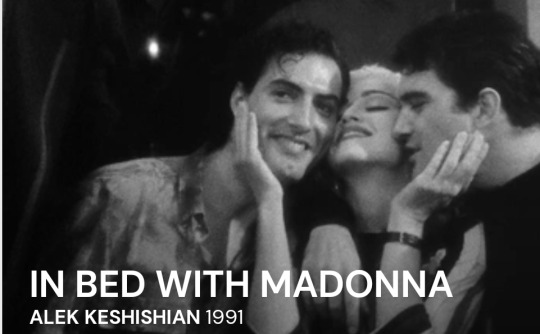
Of course Madonna is always in control of her image and what she allows to be seen or how she comes across. But that doesn't mean there's nothing genuine there, on the contrary. And the camera captures that. The backstage, the everyday conversations, the relationship with the dancers. Real people with real emotions and the more darker parts are allowed to slip in through the cracks. On top of that, it has footage from her tour in 90-91, a reminder of how Madonna is one of the best performers out there, making me wish there'd be a time machine so I can see her live during that time.
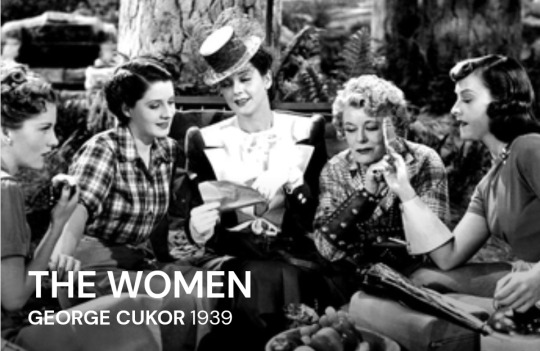
For anyone who is a fan of Sex and The City, how about a late 1930s version? Fast pace dialogue, outfits to die for and a cast made almost entirely of women.
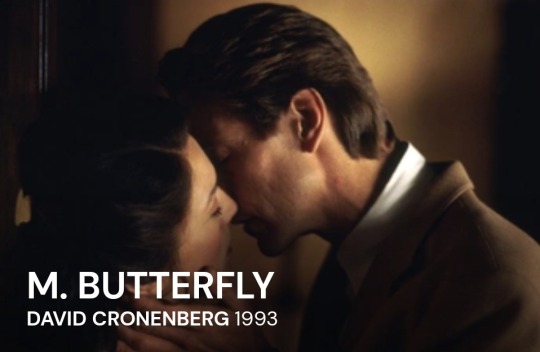
The second Cronenberg on the 2023 list. I watched M. Butterfly after seeing Madame Butterfly at the opera. The film is slightly different and it deals with some of my favorite themes in fiction and media lately: gender identities, criticism of colonialism, orientalist fantasies that obscure realities and so much more.
#m thoughts#top 10 films in 2023#crash david cronenberg#m butterfly#body double#hardcore 1978#fedora billy wilder#mommy dearest#women 1939#in bed with Madonna#crimes of passion#vive l'amour
20 notes
·
View notes
Text
Rambling
Since turbans act as an orientalist motif in Homestuck, I thought I might try scanning for hijabs as well. "The Veil" was the first suspect, but textual support did not immediately materialize. At least not in the form of wordplay -- it's mildly suspect that the game's cloning equipment is within the Veil, since the first lab we see is associated with Mom, but since the meteors in turn become the sperm impregnating Skaia/the Earth, I'm hesitant to commit to the gendering. Maybe one of those "size of your mom's dick" kind of moments? Shrug
"Curtain" was the next search term -- apparently the word hijab originally described a curtain separating Muhammad's main house from the wives' quarters, for modesty. Presuming euphemism, it becomes interesting that Karkat (who I tend to read as Alternia's only Female) is determinedly buried behind thick curtains at the beginning of Meat, as though they were part of his feminine repertoire of hysteric fits and romcoms -- all the more so because Dave reasons it would probably be fine to throw stones in a glass house if curtains were up, insofar as stoning-as-execution is still proscribed under some interpretations of Islamic law. Going back to the Veil, this would imply the meteor strikes are framed as a planetary stoning? Which in turn brings about the mummy-shrouded Exiles, wandering the sand dunes. Unexpectedly tidy, if we permit that the narrative's need to denigrate the Terrorist overrides any strict gendering
Other instances of curtain don't scan as readily... the various "pay no attention to the X behind the curtain" Wizard of Oz jokes seem ripe for misuse, but nothing stands out... Jane's comment on the "right" side of curtain being the side where everyone can see you... it rings as passive aggressive in light of the Islamophobic superstructure, but unlike with Dave I can't identify a complementary signifier to affirm the superstructure's applicability. Mildly annoying. But if you /assume/ its applicability, gently coaxing Calliope out from behind the curtain and encouraging her to be herself likewise comes across as somewhat passive-aggressive, I suppose
All that stuff about Roxy's Void-based unknowability from the Epilogues had struck me a sexist mystification, but the association with veils of darkness gives the misogyny a certain orientalist flavor... and if that holds, Roxy's earlier blackout powers fall under the same banner...? I don't recall anything objectionable in the discussion of them though... If Doc Scratch's head is a turban, I suppose the grimdark blackout becomes Rose's veil, adding to the sense of assault that came with Scratch "smothering her with surprise noodles" (eroticizing the question mark).
The cue-ball/turban is also light, of course, and the matter of Karkat blocking out the light contributes to his feminine framing... though I suppose the same could be said of the Strider's sunglasses? "Those rare, intimate moments that Jake was allowed to slip off Dirk’s shades and look upon his face, unobstructed" might be leaning into the erotics of removing a lady's veil... as well as the general mystique built up around Strider Eye Moments. The artifact of Stoic Masculinity doubles as an artifact of Islamic Femininity. Textual affirmation in the form of puns isn't really forth coming, but the matter AR wanting to get out of the shades might have an undertone of cultural condescension akin to Callie and the curtain... especially since as "anime shades" that "literally only the Japanese could consider to embody the Platonic ideal of 'cool,'" the sunglasses are explicitly linked to the Orient
11 notes
·
View notes
Text
Finished watching that long-ass but well-done Contrapoints video on Twilight and it wasn’t clownish!!! It was literate!!! For once!!! Still, I have des Notes(tm):
Not sophisticated people like Contrapoints mixing up movie and book canon willy-nilly. 😑 Some of her analysis and argument, then, is greatly weakened by this, especially when she mentions Bella’s nightmare in Breaking Dawn (very different film vs. movie). Make it clear which one you’re talking about, sis!!!
By that token, her claim that the Port Angeles scene and the James fight in the ballet studio are examples of disavowal is not held up by the books. The would-be rapists are not described in any way, much less erotically; the focus is on Edward’s rescue and his fury. James is not even described as typically beautiful, actually average, and his framing is that of a typical villain
Re: Disavowal theory, Contrapoints misses the fact that Bella is a parentified teen of working class parents. There is even an in-canon explanation re: Midnight Sun as to why she doesn’t like birthdays (spoiler: her mother just dngaf). So Bella’s distaste for attention and parties and money is not an affectation or maidenly disavowal. It is a character weakness stemming from neglect. Her character arc is to accept her worth and to move away from disavowal and play-acting modesty, embracing her true self
She greatly undersells how much Twilight subverts typical gender roles and conventions. It’s Bella who wants vampirism, Bella who wants sex from Edward, Bella who comes up with plans and solutions, Bella who saved Edward. It’s Bella whose mind can’t be penetrated or manipulated, who develops an interest in motorcycles and loves her truck. Vampire Bella may be fully realized in her autonomy both physically and socially, but Human Bella did well with what she could do and worked hard to reach her goals (vampirism, sex with Edward). She was only physically weak.
Twilight also subverts the B&B/predator-prey dynamic just as much as it eroticizes it. Bella and Edward personality-wise are much more alike than different (there is definitely several shades of Romeo and Juliet there), so their physical inequality ends up being yet another obstacle to their romance rather than an inherent part of their dynamic. A big chunk of the reason why Bella wants to be a vampire so badly is because she knows it’s the only way to truly be with Edward, that this man-of-steel-woman-of-tissue situation cannot continue. The end of series sees Bella and Edward as explicit equals
Also, also, from the way the vampires are written in Twilight, becoming a vampire can be interpreted as very much an escape from patriarchal life. No need to cook or clean, male vampires can’t get you pregnant, and even if a male vampire threatens you, you have your own power to fend them off. Sex-based discrimination is impossible in the vampiric world. Only individual cases of misogyny can exist. So there’s that
For that token, there were and are hundreds of romance novels and erotica that do—or try to do—the same thing as Twilight. Before Twilight there was the Vampire Diaries and Buffy the Vampire Slayer. And yet, while highly popular, none of these were as great a phenomenon as Twilight. Unfortunately, Contrapoints doesn’t really delve into what makes Twilight different from the world of romance and erotica, only why it was a success
A+ meta on how romance novels work. It’s a little no duh, but she explains it so well and eloquently
The toxic radfem/political lesbianism theory section explains the pearl-clutching around Twilight and Fifty Shades and misunderstandings about Twilight but did we really need a whole section on toxic radfem theory???? Otoh, I agree that bad intellectual ideas are super entertaining
Pamela discourse!!! Yeah, I learned all about that in my Development of the Novel course, it’s all good ☕️. But I disagree slightly with Contrapoints in that Twilight is not following that tradition. Bella does have virtue and purity signifiers; in many ways she falls under the Beautiful Maiden(tm) trope. But once again, Meyer gives it a twist in that Bella is portrayed as a modern agnostic girl who wants Edward’s D—preferably without marriage. And the narrative essentially cheers her on. Pamela would never
That Kristen Stewart interview where she says she didn’t feel like she was playing a character made me die inside and wonder if she has read the books. Contrapoints implicitly agreeing with her that Bella is a placeholder character made me die inside and wonder if she has truly read the books
Not Contrapoints actually agreeing with St. Augustine, that African-intellectual-turned-religious-dumbass 😑 Yeah, no, I do not agree that lust is inherently perverted. For one thing, what is “perversion” and what is “normal”? Spoiler alert: It basically all comes down to cultural and religious bias. It’s true that the sex act involves crossing boundaries and penetration of some form, but that in and of itself not inherently violent. You can hurt yourself exercising; doesn’t mean it’s something horribly violent!!! So yeah, there’s my fuck-St-Augustine rant for the day
#twilight#twilight meta#much food for thought#but at least contrapoints understands romance#and she makes tons of good points#contrapoints
8 notes
·
View notes
Text
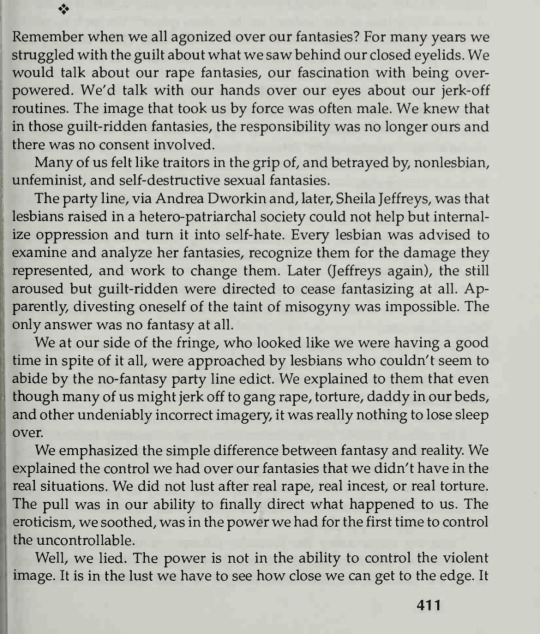
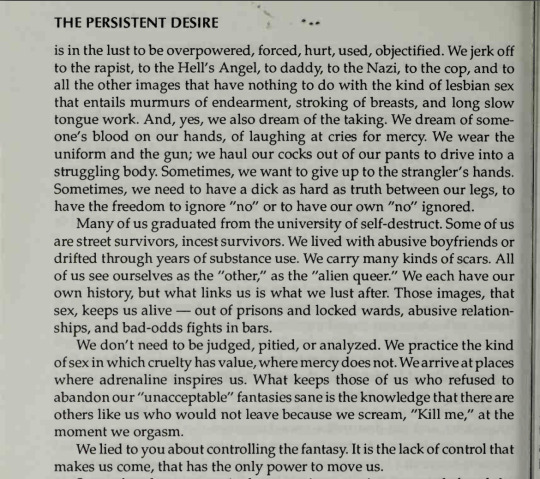
Remember when we all agonized over our fantasies? For many years we struggled with the guilt about what we saw behind our closed eyelids. We would talk about our rape fantasies, our fascination with being over-powered. We'd talk with our hands over our eyes about our jerk-off routines. The image that took us by force was often male. We knew that in those guilt-ridden fantasies, the responsibility was no longer ours and there was no consent involved.
Many of us felt like traitors in the grip of, and betrayed by, nonlesbian, unfeminist, and self-destructive sexual fantasies.
The party line, via Andrea Dworkin and, later, Sheila Jeffreys, was that lesbians raised in a hetero-patriarchal society could not help but internalize oppression and turn it into self-hate. Every lesbian was advised to examine and analyze her fantasies, recognize them for the damage they represented, and work to change them. Later (Jeffreys again), the still aroused but guilt ridden were directed to cease fantasizing at all. Apparently divesting oneself of the taint of misogyny was impossible. The only answer was no fantasy at all.
We at our side of the fringe, who looked like we were having a good time in spite of it all, were approached by lesbians who couldn't seem to abide by the no fantasy party line edict. We explained to them that even though many of us might jerk off to gang rape, torture, daddy in our bds, and other undeniably incorrect imagery, it was really nothing to lose sleep over.
We emphasized the simple difference between fantasy and reality. We explained the control we had over our fantasies that we didn't have in the real situations. We did not lust after real rape, real incest, or real torture. The pull was in our ability to finally direct what happened to us. The eroticism, we soothed, was in the power we had for the first time to control the uncontrollable.
Well, we lied. The power is not in the ability to control the violent image. It is in the lust we have to see how close we can get to the edge. It is in the lust to be overpowered, forced, hurt, used, objectified. We jerk off to the rapist, to the Hell's Angel, to daddy, to the Nazi, to the cop, and to all the other images that have nothing to do with the kind of lesbian sex that entails murmurs of endearment, stroking of breasts, and long slow tongue work. And, yes, we also dream of the taking. We dream of some-one's blood in our hands, of laughing at cries for mercy. We wear the uniform and the gun; we haul our cocks out of our pants to drive into a struggling body. Sometimes, we want to give up to the strangler's hands. Sometimes, we need to have a dick as hard as truth between our legs, to have the freedom to ignore "no" or to have our own "no" ignored.
Many of us graduated from the university of self-destruct. Some of us are street survivors, incest survivors. We lived with abusive boyfriends or drifted through years of substance use. We carry many kinds of scars. All of us see ourselves as the "other," as the "alien queer." We each have our own history, but what links us is what we lust after. Those images, that sex, keeps us alive - out of prison and locked wards, abusive relationships, and bad-odd fights in bars.
We don't need to be judged, pitied, or analyzed. We practice the kind of sex in which cruelty has value, where mercy does not. We arrive at places where adrenaline inspires us. What keeps those of us who refused to abandon our "unacceptable" fantasies sane is the knowledge that there are others like us who would not leave because we scream, "Kill me," at the moment we orgasm.
We lied to you about controlling the fantasy. it is the lack of control that makes us come, that has the only power to move us."
-"Sex, Lies, and Penetration: a Butch finally 'fesses up" Jan Brown, The Persistent Desire (edited by Joan Nestle) (1992)
#the persistent desire#joan nestle#jan brown#lesbian#queer#lesbianism#lesbian history#queer history#the sex wars#queer sexuality#lesbian lit#lesbian writings#lesbian feminism#lesbian feminist history#feminist history#feminism#this one is sure to be controversial!#but it sure feels pertinent to uh.. some things that have happened in our culture#abuse mention#rape mention
25 notes
·
View notes
Text
actually im going to post this here because i feel like you guys would love this: an analysis of Jane Prentiss and The Crawling Rot from the perspective of a queer person with OCD and frankly too much trauma lmao
CW/TW for jane prentiss, misogyny, sex culture, addiction, and talk of abusive relationships of all flavors
My latest post is a little bit of a commentary on the tie of eroticism with the body in its barest form and the societal stigma of body hair on the female form. something about the supposed revulsion of body hair on a "woman", when Jane Prentiss is far beyond the point of a woman here.
When she died and became the Hive she obviously wouldn't have been at the absolute physical peak of eroticism- she was struggling with delusions and compulsions and the siren song of The Crawling Rot. I also find that the bare legs (eroticism) paired with hairy underarms gives a unique view on the objectification of AFAB people in society. Jane Prentiss is a woman but she is also the thousands of wasp maggots living in the husk that is her body. being the epitome of eroticism with her form and legs and dress but showing decay/waste/disease/offness in her flesh is very true to her purpose.
I was also deliberate in having the maggots and holes so small on her body. She is supposed to look not only fairly normal, but attractive from a first glance. It is only when you look closer that you realize that something is horribly wrong. I had intended to give her skin more discoloration but given the time period I had planned this to be (sometime around the events of Timothy Hodge's statement, MAG 6) I think the illusion of clear skin from a distance works very well.
In terms of the greater symbolism of The Crawling Rot (and the source of most of the content warnings):
its important to me how essential the idea of eroticism is to Jane's manifestation of the Corruption- the corruption is gross icky buggy things but its also sexual abuse, power imbalances, toxic relationships, cults. it's the nausea you feel when you learn that someone has exploited you for something you never wanted to give, it's the fear of your consent being undermined. its the confliction of loving someone and knowing they are corrupting you but still not wanting to lose the wholeness you feel with them. It's a friend who convinces you to steal or drink or smoke or fuck then some then all or worse with them because it will make you feel better, more whole, more connected, but all it does is make you want to crawl out of your skin then burn your own corpse.
this here is actually where i feel the corruption and the spiral & web tie together fairly well- all of them can feel like alternative perspectives on the same event, just focusing on different fears and traumas that could stem from it
#tma#the magnus archives#the corruption#the crawling rot#jane prentiss#tma jane prentiss#tma analysis#tma essay#tma theory#ramblings#mine#magnuspod#magnusposting#cw jane prentiss#tw abuse#tw sex abuse#tw drugs#tw misogyny#media analysis#love jonny and alex for not taking tma in directions that they dont have enough experience to feel comfy portraying#however that doesnt stop me from analyzing it in that way
14 notes
·
View notes
Note
do you have any recommendations for western outlaw romances? i’m really into historical stuff, but i’d like a change of scenery. also i’ve gone through almost 20 of your book recs so far and loved all of them so thank you for your service!!!
No problem! I enjoy giving recs, it's fun for me. And motivates me to read more, of course.
I don't read a lot of westerns, and unfortunately a lot of those I have are kinda old? Westerns are always a little dicier on a racial level than other periods of historicals, which is honestly kinda weird as like... 1800s England.... was also very racist. But it could be the direct interaction westerns always have with Native characters, and sometimes with Black characters as well. Plus, obviously, a romanticized perspective white readers have long had re: England.
And I suppose that for me, the misogyny in romance CAN (not always--can) be wielded in a way that folds into the way contemporary women have struggled with sexual mores, gender, and eroticism throughout the decades of romance being published. But racism in romance can't be reconciled, so westerns are harder.
Anyway--all that to say, I cautiously, acknowledging that there are some dated things in both, would say you should check out:
Angel by Johanna Lindsey. Angel is less an outlaw than a hired assassin, but it's basically the same thing. Like. He shoots people a lot? But it's somewhat legal, in western romance law. He's paid to protect the heroine because she's basically gotten in the middle of a blood feud between two families by being a meddler. There's some dubcon, but it's waaaaaaaay lighter than anything you hear about with earlier Lindseys. Like, Cassie is VERY relieved when he finally has sex with her. And just generally dated attitudes throughout, mentions of Colt Thunder of the legendarily problematic Savage Thunder. It is, FWIW, the first romance novel I ever read.
The Lady and The Outlaw by Lorraine Heath. This is a book I don't recommend often because it's dated and it has a twist that I think was meant to do something positive but hasn't aged well. Aside from that subplot, I think it's a good book. Anyway, the heroine is blind and is kidnapped by a band of outlaws, one of which ends up falling for her along the way--with the idea that she can't identify him. But she ends up being a HANDFUL.
So yeah, neither one of these is a book I recommend without serious reservations, but those are honestly the only outlaw books I would go there with.
#romance novel blogging#book recs#romance novels#beverly jenkins writes a lot of westerns but i don't think i've read an outlaw one yet#not saying they don't exist i just haven't read em
4 notes
·
View notes
Note
wouldn't even mind the "the body horror the machinery the juxtaposition of blood and bones gorehound the eroticism of transformation consuming someone is the highest form of love blah blah blah" thing if anyone was genuine about it it's so boring because it's like almost nobody actually cares or is thinking about it half of them are just trend hopping and making the same post over and over again. imo 😴😴😴
yeah i mean to me personally i don't find violence that interesting on an aesthetic or narrative or WHATEVER level, i think it's frequently used in a symbolic context by people who are not creative enough to come up with a more interesting representation for the message of their work. it comes across as trite and sophomoric or simply just lazy. like ok yeah we all had our tarantino phase, let's move on!! i think it can be utilized well but only in certain contexts (i.e. fine art [paintings, sculpture] where the medium is itself traditionally understood as austere and inert and the violence of the image contrasts with that association) and by very talented creators who are actually trying to say something interesting and new about humans and their bodies and the relationships between people etc. which most people aren't.
and don't get me wrong i love a good freudian stabbing scene but there's so much more interesting stuff you can get into wrt psychoanalysis particularly in cinema if you like...actually study the subject and see what people have been writing about for years and develop your own opinions in response to them. the politics of horror media are really complicated imo depending on what school of thought you're coming from, particularly in regards to body horror/depictions of non-normative bodies across different film genres. and of course the misogyny and racism involved as well...
i don't care about the eroticism of the machine stuff because i genuinely think it's stupid LOL it's just not to my taste at all. who gives a shit about a robot it's a robot. but i'm also allergic to sci-fi in general so that's a personal problem i guess. and i don't like vampires because i don't like Creatures or anything supernatural. i want REAL LIFE baby!!!!
but in the end ur right it's just trend hopping and most ppl aren't reading or even watching whatever media is always included in that kind of post, they just see blood consumption eroticism holy holy and hit reblog lol. which is fine i don't read everything i reblog quotes from. still...a little effort would be nice
#sorry i went full pretentious mode with this#also anon you summarized that genre of post much better than i did in my own post lmao#Anonymous
10 notes
·
View notes
Note
I think a lot of folks are genuinely afraid of helaemond becoming good/fluffy/Romantic (with a capital R) canon incest with a dose of angst.
They can ship helaegon (and aegond) because they're in a way unsalvagable drab incest on first sight that deals with the heavier/unpleasant themes of incest in a more direct fashion and the other is... Yaoi aha. Like aegond is never going to be canonTM, partially due to homophobia, like folks just ain't ready for the nasty bro on bro action on an HBO show quiet yet, and even if it was portrayed, it would be two brothers committing sexual violence on each other and not making love, which passes the "is this Incest Problematized enough for my taste?" test. Folks know Helaegon is perceived Bad, and both, but especially Aegond, will remain silly fandom activities, while Helaemond has a pretty good shot at becoming canon and Romantic - like there is a reason a lot of helaemond shippers are into the naerys/aemon of it all. For a lot of folks it's not that they can't stand incest explored in fiction at all, they just have a limit to the tone and the way it's explored, which is very fair but why not admit to it and mute/block instead of getting into these silly fights. Hell, as a helaemond shipper I've muted and blocked plenty of other helaemond shippers myself bcs I found their takes/portrayals unpleasant or just tiring/lame. But like helaemond has 500 fics, of course, there's going to be shit I don't care for.
I'm very sympathetic to those folks bcs a lot of them seem open about being survivors of incest, and as one myself I went through a phase of finding Romantic/Erotic incest unacceptable to write/portray/consume, but I got over it because I simply can't control what others will create, only what I chose to see, and actually Romantic/Erotic incest is fun! and it's all much more complicated than just this portrayal bad this portrayal good.
But I do think its also just a lot of simple "my ship is better than ur ship" in a veneer of Calvinistic pseudo-critical fictional incest-aversed internet beef where folks are trolls and snivelling assholes to each other.
The funny bit is I really got into helaegon chuz seeing their portrayal on hotd was harrowing and the first thing my mind went to wasn't "OHHH this is 100% unsalvagable I guess let's just skip very fast over it to when Aegon gets set on fire and Helaena kills herself because incest BAD" it was "well there HAD to be nice moments between them, a little windows of a pleasant conversation or a touch that didn't make both recoil and want to vomit 🤔" and to some even this line of thoughts will be read as dangerous Romanticizing/Fetishising/Deproblematicizing of Incest but honestly it mostly comes from a place of hopefulness, but also I'm a sucker for the eroticized aesthetic of hetro gothicstwinnage where both are the same height. "We have nothing in common" yes you do sit your shortass down.
My final take is learn to mute/block/curate your space, fuck shit all and let Aegon ON SCREEN fuck his entire family in varying degrees of Romanticized and Deconstructed but now I'm going to get accusations of misogyny and rape apologism bcs I'm centring the experience of the fictional anti-christ in the Incest Chronicles🏃♂️🏃♂️🏃♂️ gotta blast!
This is such an interesting insight into what might actually be going on in people's minds, thank you for sending this. I'm sure my visitors will enjoy reading your thoughts.
People being afraid of helaemond because it's the one ship presented in a positive light is something that never really crossed my mind before. To me it's more like having a small reprieve from all the darkness before the hard-hitting horror really takes over the story. It's true that helaemond can be depicted as really fluffly, but, as a counter-argument, it's still impossible to escape the fact that it's shrouded in angst. For those "fearing" it because they're against the romanticisation, there's really no true way these two can get an ending that's not tinged with some kind of sadness.
But, in any case, like you said, I don't really find that line of thought necessarily helpful - more that it tends to lead to policing and moralisation and finger-wagging that inevitably will end up looking silly.
I can't really speak on this topic with authority, because my experience is limited to fandom discourse, but I've seen survivors of incest and other kinds of sexual abuse willing to explore these topics in the safe confines of fiction in a variety of tones. So, as far as my approach to these sensitive topics, I wouldn't feel comfortable to regulate the way they choose to express and process their obviously very complex thoughts on the matter. It would feel very hypocritical and out of place for me to do that, hence why I don't resonate with the frequent moral dogpilling. It's important to keep in mind that no real life people are harmed by someone writing fiction.
I think that, as long as we remain respectful and enforce our boundaries when necessary, there's a very clear divide between what's acceptable in fiction and what's desirable in reality. Personally, I never found those lines blurring as a result of my fiction consumption, even though my tastes tend to run darker. Not to say this means one should be comfortable with everything all of the time, but being mindful of one's own triggers also means acknowledging that others' thresholds may vary. And having an honest conversation with yourself on whether or not those are actual triggers or you're just really enjoying some kind of power trip here and the fandom social currency it might earn you. Paradoxically speaking, the people crossing the fiction-reality divide are the ones choosing to engage in harassment and bullying and hypocritical exclusion behaviour on behalf of fictional characters' honours, not the ones making two fake people kiss in la la land.
That being said, us freaks will not rest until we'll make brocest a thing! Slowly but surely, they'll run out of ways to shock the public eventually and will have to give in to us. 😅
11 notes
·
View notes